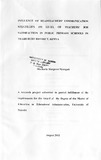| dc.description.abstract | Communication is fundamental to the whole process of education. The study aimed at determining the influence of headteachers' communication strategies on level of teachers' job satisfaction in public primary schools in Nyahururu District. The study was conceived due to the allegations of poor communication strategies and poor motivation of teachers in public primary schools causing low morale among teachers resulting to poor curriculum delivery, indiscipline and poor standards. To carry out the study, research objectives were formulated on the types of communication frequently used by headteachers that influence level of teachers' job satisfaction, and whether headteachers' communication strategies address teachers' problems hence influencing job satisfaction, and the barriers to effective communication between headteachers and teachers.
The study adopted Descriptive Survey Design, the study targeted 67 public primary mixed schools and 788 teachers, out of which a sample size of 57 headteachers and 258 teachers was selected. Data were collected using teachers' and headteachers' questionnaires, observation guide to record facilities of communication available in school and school document analysis guide to find out whether school documents contain crucial information required for proper school administration. There was also instrument validity and reliability. Data were then analyzed through descriptive statistics and presented inform of tables and figures.
The study findings indicated that higher proportion (96.7%) of teachers and (100%) headteachers recognized the need for two-way communication network at school that would create job satisfaction. Concerning the barriers to effective communication, higher proportion of the teachers indicated lack of time for regular meetings (32%), authoritative headteachers (13.3%), lack of trust by the headteachers (20%), headteacher absenteeism (20%) and headteacher favourism (13.3%) to be some of the causes of dissatisfaction in schools. However, teachers suggested possess remedies to be as follows; headteachers have to avoid spontaneous decisions, (represented by 20%), exercise lateral and two-way communication networks (20%) and encourage teachers to air out views openly (26.7%).
The study, therefore, recommends that headteachers should use a hybrid of communication strategies to achieve effective communication between teachers and students for purposes of job satisfaction. In addition, government agencies like Kenya Education Management Institute (KEMI) mandated with teacher training to emphasize on the need of every headteacher to undertake management and communication skills course to enable them realize the importance of effective communication at school. | en_US |

